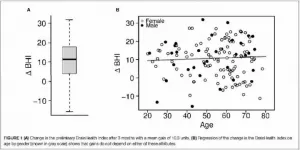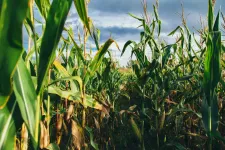(Press-News.org) Health care systems could save lives and minimize losses by optimizing resource allocation and implementing mitigation strategies, according to two new studies. Colorado State University researchers explored how our health care systems might perform under multiple disasters and multiple waves of COVID-19, and how we can keep them functioning when we need them most.
In the first study, published in Nature Communications, Civil and Environmental Engineering Ph.D. student Emad Hassan and Associate Professor Hussam Mahmoud investigated the compound effects of pandemics and natural disasters on health care systems. They combined wildfire data with projections of the spread of COVID-19 to evaluate different strategies for managing patient demand in the event of concurrent disasters. They found that better resource allocation and mitigation strategies, such as organized evacuation, protecting shelter residents and using non-acute hospital beds, could result in fewer COVID cases and deaths.
"We showed that applying these measures can substantially reduce disease spread and improve patient outcomes," Hassan said.
A one-two punch
Wildfires occur every year in the U.S., and they increase the demands on our health care systems. Wildfire smoke victims may require some of the same resources needed by COVID patients, such as ventilators. For these reasons, Hassan and Mahmoud chose to study wildfire in conjunction with the pandemic.
To measure hospital functionality under the simultaneous burdens of pandemic and wildfire, Hassan and Mahmoud used a health care system model they developed previously and a new disease transmission model they created to predict the number of people in different stages of COVID-19. They modified a well-known disease transmission model, SEIR, to include additional stages of the disease.
SEIR stands for Susceptible, Exposed, Infectious and Recovered. The CSU researchers augmented the model to include susceptible, insusceptible, exposed, infective, quarantined, hospitalized, ICU admitted, ventilator-dependent, recovered and deceased.
Bracing for more waves
Using the two models they developed, along with publicly available data on the number and type of beds available in each hospital, Hassan and Mahmoud:
-Calculated the extent of disease transmission under various scenarios in every county in the U.S.
-Determined the risk of easing restrictions and the resulting shortage of beds by type - inpatient vs. intensive care, for example.
-Identified the counties where patient demand could exceed health care system capacity and presented mitigation strategies that could reduce the number of cases requiring medical services.
Their analysis, published in PLOS One, predicts how additional waves of COVID-19 might unfold.
The study shows that stricter COVID-19 preventive measures - including mask mandates, social distancing, and shutting down schools, workplaces and indoor activities - could reduce the number of hospitalized cases by as much as 12.8%. On the other hand, lifting restrictions could cause a spike in hospitalizations 13.7 times higher than the second wave's peak - pushing hospitals in many counties beyond their capacity.
"It really is an effective way of reflecting on additional requirements for health care systems to support additional waves," Mahmoud said.
Hassan and Mahmoud hope planners, policymakers and state officials can use their research to make decisions about additional resources and when to ease restrictions. Their disease transmission model, which predicts how many patients will be in each stage of the disease, could help hospitals allocate resources accordingly.
Odds of a double disaster trending upward
Until recently, Hassan and Mahmoud's research has focused on natural disasters and community resilience. When the World Health Organization declared a global pandemic, they shifted their focus to include pandemics, realizing the loss of life from a pandemic is far greater than the death toll from individual natural disasters.
"The reality of it is pandemics happen more often than extreme events, and the losses are obviously off the charts," Mahmoud said. "We know it will happen again in 100 years, if not less."
Hassan and Mahmoud hope their work will help improve health care management in the future, which promises more frequent and more devastating natural disasters with climate change and population growth.
"We've got to figure out how we can optimize our societies to handle all these stressors, while continuing to prosper," Mahmoud said.
INFORMATION:
Nature Communications: https://www.nature.com/articles/s41467-021-21581-x
PLOS ONE: https://journals.plos.org/plosone/article?id=10.1371/journal.pone.0247463
DALLAS (March 9, 2021) - Better brain health and performance for humankind is one step closer to reality with the successful trial of the groundbreaking BrainHealth Project. A cross-disciplinary team with the Center for BrainHealth® at The University of Texas at Dallas unveiled an easy-to-use online platform that delivers a novel, science-backed approach to measuring, improving and tracking one's own brain fitness.
A key innovation of the Project centers on the BrainHealth Index™ (BHI), which is based on a multidimensional definition of brain health and its upward potential. The BHI is a composite derived from a series of best-in-class assessments that explore ...
Farmers in the Midwest may be able to bypass the warming climate not by getting more water for their crops, but instead by adapting to climate change through soil management says a new study from Michigan State University.
"The Midwest supplies 30% of the world's corn and soybeans," said Bruno Basso, an ecosystems scientist and MSU Foundation Professor in the Department of Earth and Environmental Sciences within the College of Natural Science. "These crops are sensitive to temperature and water changes."
Previous studies have suggested that by 2050, the Midwest will need about 35% more water to sustain its current levels of corn and soybean yields. But research done by Basso and colleagues found that the data does not support this idea. The Midwest is in a unique location that ...
If past natural disasters have taught us anything about their effects on pregnant women and developing babies, it is to pay close attention, for the added stress will surely have an impact on them. Amanda Venta, associate professor of psychology at the University of Houston, is sounding that alarm as it relates to the COVID-19 pandemic in a newly released study published in Child Psychiatry & Human Development.
"There is strong evidence to suggest that the coronavirus pandemic will affect mothers and infants through immune pathways that, in previous research, have been shown to link stress and social isolation during the pre- and post-natal periods with deficits in maternal mental health and infant well-being and development across developmental stages," reports Venta.
Research ...
The relationship between the Hawaiian bobtail squid and the bioluminescent bacteria living in its light organ has been studied for decades as a model of symbiosis. Now researchers have used a powerful chemical analysis tool to identify a small molecule produced by the bacteria that appears to play an important role in their colonization of the light organ.
The study, published March 9 in the journal mBio, adds a new wrinkle to scientists' understanding of the chemical signaling involved in this iconic symbiotic relationship. "It's exciting that there are still new things to discover, even in such a well-studied system," said corresponding author Laura Sanchez, associate professor ...
A new systematic review of evidence recommends the use of behavioral self-management treatments for common urinary issues experienced by upwards of 70 percent of older men. Common symptoms include trouble urinating, increased frequency and incontinence. These symptoms can have a substantial negative impact on sleep, social functioning and quality of life. Several guidelines recommend self-management techniques like health education, advice on fluid intake, and bladder retraining; however, in practice, self-management is often excluded from the menu of treatment options that include medication and surgery.
Researchers at Bond University's Institute for Evidence-Based Healthcare found that self-management interventions reduced the severity of lower urinary tract symptoms. The ...
Wormholes play a key role in many science fiction films - often as a shortcut between two distant points in space. In physics, however, these tunnels in spacetime have remained purely hypothetical. An international team led by Dr. Jose Luis Blázquez-Salcedo of the University of Oldenburg has now presented a new theoretical model in the science journal Physical Review Letters that makes microscopic wormholes seem less far-fetched than in previous theories.
Wormholes, like black holes, appear in the equations of Albert Einstein's general theory ...
A mobile app designed to help women manage urinary incontinence was as effective as usual, in-person treatment of incontinence in primary care, according to new research from the Netherlands. The study included 262 women with frequent stress incontinence, overactive bladder or a mix of symptoms. Participants were randomly assigned to use a standalone mobile app called URinControl, which offered pelvic floor muscle and bladder training exercises. Those in a control group received standard care and were referred to their own primary care doctors who were broadly advised to follow the Dutch guidelines for primary care. After four months, ...
Since the early 2010s, ultrafast probing of materials at atomic-level resolution has been enabled by terahertz scanning tunneling microscopes (THz-STM). But these devices can't detect the dissipation of energy that happens during events such as when photons are emitted via recombination process of an electron-hole pair in a light emitting diode (LED). However, a new technique allows the tracking of just such energy dynamics alongside THz-STM, opening up new avenues of investigation for nanoscale science and technology.
Researchers in Japan have developed a microscopy technique that combines the ability to manipulate the motion of electrons on a femtosecond timescale ...
According to two national surveys by researchers at the University of Michigan Medical School, US teens and young adults are engaged in the ongoing COVID-19 pandemic with most being knowledgeable about the disease, concerned about its impacts on others, and practicing social distancing. On March 6, 2020, 70 percent reported knowledge of the pandemic, with 46 percent noting they got information from news sources. By March 20, 2020, nearly all respondents, 95 percent, reported impact. Worry about the pandemic increased from 25 to 51 percent. For some young people who weren't worried early on about the pandemic, staying at home and engaging in other preventive public health guidelines made them feel safer. Between the two surveys, pandemic preparation seemed to shift. ...
Evidence published in the Cochrane Library today will reassure people who want to stop smoking that quitting for at least 6 weeks may improve their mental wellbeing, by reducing anxiety, depression, and stress. People's social relationships are unlikely to suffer if they stop smoking.
Smoking is the world's leading cause of preventable illness and death. One in every two people who smoke will die of a smoking-related disease unless they quit. Some people believe that smoking helps reduce stress and other mental health symptoms, and that quitting smoking might make their mental health problems worse. People who smoke may also worry that stopping smoking will have a negative impact on their social lives and friendships.
The review found that people who stopped smoking for at least 6 weeks ...



